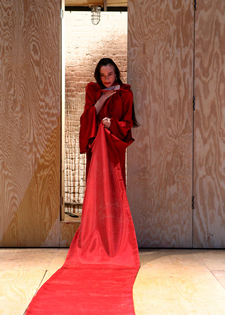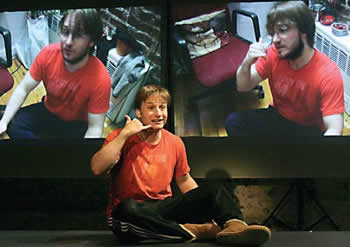HotReview.org Editor's
Picks
Shows Worth Seeing:

An Oresteia
Agamemnon, by Aeschylus
Electra, by Sophocles
Orestes, by Euripides
Classic Stage Company
136 E. 13th St.
Box office: 866-811-4111
Aeschylus’s The
Oresteia, a cornerstone of our dramatic literature, is the
only complete trilogy of Greek tragedies we possess. It tells
the story of a string of mythical revenge murders in the House
of Atreus that culminates in a climactic trial scene celebrating
the Athenian justice system and resolving all the human and cosmic
rifts by subordinating the interests of the Female to the Male.
CSC Artistic Director Brian Kulick had the provocative idea of
dramatizing the same tale using one play by each of the Greek
tragedians—constructing an artificial trilogy, in effect,
with a very different development and a much more disturbing and
inconclusive ending. The result is fascinating and extraordinarily
worthwhile. It’s a quirky idea, this “new” trilogy,
not least because Aeschylus, Sophocles and Euripides have such
different voices. They deal with similar mythic material but give
it entirely different spins, and the first and last plays were
written nearly 100 years apart during a century when the Athenian
city-state went from imperial self-confidence and civic pride
to paralyzing self-doubt and ruinous defeat. Aeschylus’s
relationship to the material is lyrical and reverential; his characters
are larger than life, giants measuring themselves against enormous
forces. Sophocles sees driven and obsessed people rather than
giants; his characters live in a recognizable world where moral
and immoral choices have force and meaning. Euripides, in contrast,
is so disgusted with his society that he treats the myth with
sneering satire; his people are puny, devolved into thugs and
cutthroats without any recognizable moral bearings—yet,
irony of ironies, they are the most like us of all. This was Kulick’s
key perception in combining three such disparate plays—that
their trajectory exposes a tragic diminution in the profile of
the human being that speaks eloquently to what has happened to
our self-image. Kulick has also solved the biggest obstacle of
all in devising such a project, the lack of stageworthy translations:
he commissioned the terrific poet and classics scholar Anne Carson
as translator (she’d already done two of the plays and CSC
commissioned the third). The productions do have some sags and
glitches, but it’s amazing how much is right and clever
and entertaining in them. The central performances are extremely
strong and the overall effect of the day is overwhelming (I recommend
the five-hour marathon viewing). This is just the sort of risky
and fresh take on canonical work that CSC should be offering,
and it ought to be seen while it’s here.
-----------------------------------

Rambo Solo
by Pavol Liska, Kelly Copper and Zachary Oberzan
Soho Rep
46 Walker St.
Box office: 866-411-4111
The Nature Theater of Oklahoma
belongs to a niche of theatrical avant-gardism that (publicity
aside) rarely gets much real respect. I’m speaking of the
sort of performance—also seen in the work of Richard Maxwell
and the experimental companies Goat Island and Forced Entertainment,
for instance—that eschews technical polish, deliberately
blurs the boundary between hapless amateurism and professionalism,
and generally projects exhaustion with fictional narrative. Perhaps
you recently read some discouraging words about Nature Theater’s
latest piece, Rambo Solo, in one of our slick mainstream
mags. If so, you should dismiss it and hustle down to Soho Rep
to judge for yourself. With the audience seated on homey shag
carpeting on the theater’s floor, Zachary Oberzan proceeds
to explain his longstanding fascination with David Morrell’s
pulp novel First Blood, from which the first Rambo
movie was adapted. His explanation is so replete with specific
details and so packed with intense emotional investment that it
soon morphs into an enactment of the entire plot. Oberzan plays
a slightly dopey but endearing shlump who acts all the book’s
characters, performing or approximating every last martial-arts
leap and rifle shot while three different videos of him engaged
in similar activity in his tiny studio apartment are seen upstage.
He has no expertise at any of these tasks, but that's the point.
In the films he plays out the actions with household items as
props, and speaks a text identical to the one delivered onstage,
pretending the whole time that it’s extemporaneous. The
result is a stunningly resonant picture of compensatory obsession
and fixation bound to make even those of us not especially enamored
of the likes of Morrell think twice about the parts of America
modeled on his sort of pulp heroism. Oberzan’s character
is too normal to dismiss as a head case and too appealing to dismiss
as a bore, so on some level you have to take him to heart, in
all his maladroit earnestness. The show is 90 minutes long, takes
big risks with deliberate irritation (not least because of audience
participation), yet no one in the crowd the night I attended looked
irritated when leaving. Quite the contrary. This is just the sort
of wonderfully diminutive, DYI-style gem that demonstrates the
counter-intuitive promise of a group like Nature Theater’s
unpolished approach to theater.
